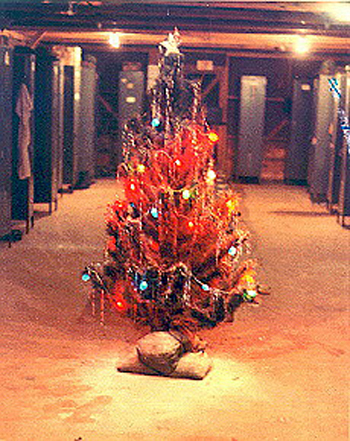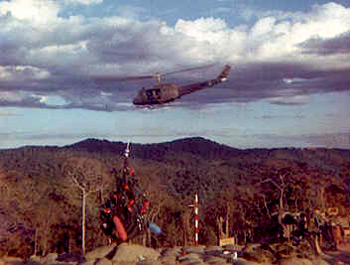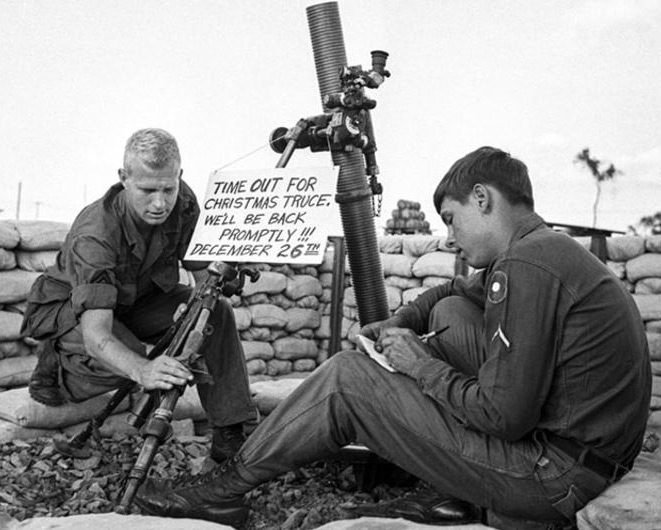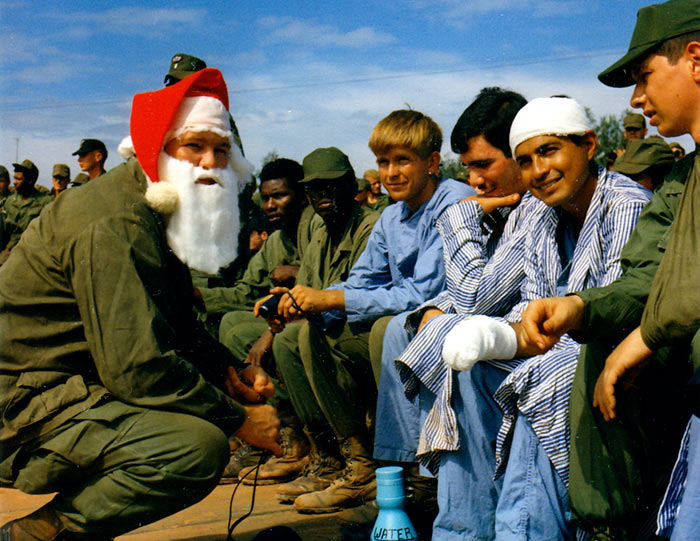
Christmas In Vietnam
Holiday Songs From America's Longest War
listen

Christmas tree in an infantry hooch, Dau Tieng, 1969
Mournful and slow (not, as one might expect, angry and fast), "Christmas In Vietnam" chronicled the sad story of thousands of young, Black men serving a lost cause on the opposite side of the world from their increasingly troubled homeland. Black men formed a disproportionate percentage of draftees and casualties in Vietnam, and this injustice fueled a growing sense of outrage in the Black community - both in the army and back at home. Literally speaking, this record tells the story of "two lonely soldiers fighting a war," but the scared, confused grunts in the song serve as metaphors for a whole generation. "It won't be merry this Christmastime," Johnny & Jon confide breathlessly, because "there's Vietcong all around me."
Needless to say, I was mesmerized. This was weird, riveting stuff that seemed to come out of nowhere. Amazingly, however, I've since discovered a number of other Christmas songs about America's conflict in Vietnam, and Johnny & Jon's "Christmas In Vietnam" - included on Rhino's Bummed Out Christmas (read more) and Paula's Merry Christmas Baby (read more) - was hardly the weirdest.
Actually, the role of music during wartime was well established by the turbulent sixties. The longing, the fear, and the bravery of soldiers and their loved ones were often reflected in popular songs during wars, and at least one Christmas song, "I'll Be Home For Christmas," played a significant role in World War II. Cowritten by Buck Ram (later the impresario behind the Platters), "I'll Be Home For Christmas" spoke - without ever specifically saying so - of the fierce homesickness that strikes at the heart of any soldier during the holiday season. Remember, the key lyric here isn't the title but the deftly worded conclusion, "if only in my dreams."
What set the Christmas songs of the Vietnam War apart was their naked honesty concerning the plight of the soldier. These guys weren't very happy to be there - at least, they didn't stay that way very long after going "in country." And, by the release of "Christmas In Vietnam," most American civilians were - in one way or another - dissatisfied with our role in Vietnam. Arch-conservative Ronald Reagan's infamous 1965 assertion that we could "pave the whole country... and be home by Christmas" was hardly a stamp of approval on President Lyndon Johnson's foreign policy. Hawks and hippies alike disapproved of our presence there, but no one felt the pain more than the boys in the foxholes.

Huey chopper flying over a Christmas tree
listen
Take, for instance, the hopelessly gung-ho recruit in Derrik Roberts' "There Won't Be Any Snow (Christmas In The Jungle)" (Roulette, 1965). Over a hokey, white-bread chorus (and gunshot sound effects recycled from old western movies), Roberts recites a letter to an unnamed sweetheart that sounds - in retrospect - stubbornly naíve. "Some people think we're fools to be here," he admits, "but I feel that my being here is like taking out a little insurance for my future - our future." It hardly comes as a surprise when - get this - Roberts' protagonist gets fragged for Christmas!
It's worth noting, however, that Roberts actually recorded two versions of the record - one where the soldier dies, and another where he doesn't. According to press at the time, the public preferred the happy ending - predictably enough. But, at least in the unhappy version featured on Christmas Past (Westside, 1998), "There Won't Be Any Snow" is one of the most accidentally funny records I've ever heard. Still, it points directly towards the rift that would soon tear the country apart.
In my mind, Roberts' earnest patriot was probably a platoon leader, and he was most likely shot by his own men - grunts like Johnny and Jon - who resented of the danger he put them in daily as he struggled in futility to win the hearts and minds of the cagey Vietnamese. The attitudes that carried us to victory in earlier wars just didn't apply here; most American citizens - let alone soldiers - had trouble identifying the threat to our security. The Viet Cong, on the other hand, were quiet certain who the enemy was, and they fought like dogs to preserve their sovereignty.
listen

Time out for Christmas truce, 1967
listen
After reassuring little Becky that he loves her (and his country), Tommy goes away. Then, the real postman shows up with a letter that makes Becky's mommy cry. Daddy cries, too, and then he puts all of Tommy's stuff in the attic. We are left to conclude that there was no big brother for Little Becky in Santa's bag - any more than there was an easy solution to the political and military quagmire that Vietnam had become. Musically speaking, "Little Becky's Christmas Wish" was a puerile, maudlin piece of crap, but it garnered significant airplay that year, showing that no matter what we thought of the war, we all grieved for lost husbands, sons, and brothers during the holidays. (Unavailable on compact disc.)
listen
No less an artist than Marvin Gaye tackled the subject of Christmas in Vietnam with "I Want To Come Home For Christmas" (Motown, 1972). Marvin exercised a surprising amount of restraint, given the righteous anger he had poured into protest songs like "What's Going On." During the intervening decade between Wine's record and Gaye's, the country had been all but torn apart by the Vietnam war. Protests, riots, the flight to Canada of our best and brightest, the shameful and heretofore unthinkable sight of returning soldiers pelted with insults - these unprecedented phenomena testified to the depth of the rift between our nation and its leadership. The record charts, meanwhile, were besieged with anti-war songs - some were virulent (Edwin Starr's "War"), some were comical (Country Joe & The Fish's "I-Feel-Like-I'm-Fixing-To Die Rag"), while others were poignant supplications to end the suffering (Freda Payne's "Bring The Boys Home").
To the contrary, the combatant in Marvin Gaye's record just wanted to get out of the filthy prisoner-of-war camp in which he found himself trapped as the war entered its waning days. "I'd give anything to see a little Christmas tree," he begins, subsequently listing all the many symbols of Christmas (mistletoe, jingle bells, Santa Claus) and America (children, family, baseball) that are burned so deeply in the hearts of any P.O.W. Each verse ends, though, with his resignation that he won't see these dear sights "unless they stop the fight." This odd, heartbreaking song was recorded in 1972 but never released until Motown included it on Christmas In The City (read more), a CD of rare Christmas tracks from Hitsville U.S.A.

Bob Hope Christmas Show, 1970
listen
One can only hope that Marvin's P.O.W. eventually got home. We can't make that wish, sadly, for the soldier eulogized by the Reverend Oris Mays (an obscure Black gospel singer) in "Another Christmas Without My Son." In the early 1960's, Mays recorded a whole album (A Tribute In Prayer - From A Soldier In Vietnam) meditating on the subject of faith in the face of war, but all Christian charity had vacated Mays' heart by the time he recorded this strange and bitter recitative (Jewel Records, 1970). The lessons that Johnny & Jon were just starting to learn back in 1966 had been taken to heart by Mays. In his mind's eye, Oris sees the totality of the carnage - a generation slaughtered, spread across the soggy battlefields of Vietnam, unable to speak up or live out their dreams.
The reality, however, is more personal. "They rushed him off to a lonely field, placed a gun in his hand, and taught him to kill," he laments. "He will never be able to say, I'm 21," and Mays finds himself just "one lonely man among thousands... spending another Christmas without my son." Though the war was several years from its ignoble conclusion, it's a scarifying postscript, and it echoes the disquieting lack of closure that America still feels regarding our losses and failures in southeast Asia. We are all of us (some more literally than others) like Rev. Mays - haunted by the lives that might have been had our leaders demonstrated more foresight or strength of will. Included on Paula Records' Merry Christmas Baby compilation (read more).Ultimately, all these Vietnam-era Christmas carols are just a footnote, really, among the vast catalogue of Christmas music - let alone the larger subject of the war itself - but a fascinating footnote, nonetheless.
As a country and as individuals we are haunted by the Vietnam War, and recent events in the Middle East would indicate we didn't learn those lessons well enough. Peace and goodwill towards men - those aren't just pretty words. Spending Christmas in Vietnam drove that home for countless soldiers, and the meaning carries forward in their stories and in these songs. If you've got a story or song to share, I'd love to hear it. Drop me a line...
Randy Anthony
Postscript. These are just six songs, and since I first wrote this article in 2001 (revised many times since), I've learned of quite a few others. And, there are even more: Last time I looked, the Vietnam Christmas Songs list at Rate Your Music listed a total of 50, though lots were outside the scope of a website dedicated to "hip" music. I still haven't tracked down a couple of these (they are missing in action, if you will), though I have been able to snag digital copies of most of them thanks to readers like you.
It's worth noting that several of the songs below (and a couple above) are definitely about both war and Christmas, and they were released during the Vietnam era - but they don't specifically mention Vietnam. Ergo, their connection to the Vietnam War can only be inferred.
- "Christmas At Home" by Webb Pierce (Decca, 1965)
- "Christmas In Vietnam" by Pvt. Charles Bowens (Rojac, 1966)
- "Christmas In Vietnam" by Joyce Brown (Drew-Blan, 1962)
- "Christmas In Vietnam" by Jack Cardwell (Astro, 1969)
- "Christmas In Vietnam" by the Soul Searchers (Songbird, 1967)
- "Christmas Prayer" by Susan Wheeler (Country Corner, 1966)
- "Christmas '65 (Draft Cards)" by Allan Sherman (Warner Brothers, 1965)
- "Christmas Without Daddy" Loretta Lynn (Decca, 1966)
- "Homemade Christmas Card" by Allen & The Lads (Secret, 1966)
- "I Won't Be Home This Christmas" by SSgt. Barry Sadler (RCA Victor, 1966)
- "A Letter For Christmas" by the Salem Travelers (Chess, 1968)
- "No Christmas Tree In Vietnam" by Rusty Wellington (Arzee, 1967)
- "Santa Claus Please Listen To Me" by Artie Fullilove (Marlu, 1968)
listen
Finally, special mention should be made of "7 O'Clock News (Silent Night)" by Simon & Garfunkel (Columbia, 1966). It takes the traditional carol - sweetly sung by the famous duo (who also happen to be Jewish) - and intersperses it with a dire news report about the state of the nation, including the Vietnam War. Heavy handed, perhaps, but effective - so much so that it inspired at least two spin-offs.
listen
The first is a parody - "White Christmas (Three O'Clock Weather Report)" credited to a certain Bobby The Poet. The record manages to ridicule Bob Dylan, Robert Kennedy, political opportunism, Christmas sentimentality, and Simon & Garfunkel - all in less than three minutes (see Cameo Parkway Holiday Hits). Brilliant! That said, it does not mention the Vietnam War, so it doesn't really belong on our list. The second one does, however. It's a cover of sorts - "Silent Night & The 11 O'Clock News" by gospel group The Shurfine Singers (Josie, 1968) that exploits the fact that Simon & Garfunkel's similarly titled recording doesn't use any copyrighted material - and thus gives them no credit whatsoever. So there!
Photo Credits. The first two photos on this page were taken from Vietnam veterans' websites, of which there are literally hundreds on the internet. I found the first image - a Christmas tree in an infantry hooch (taken in 1969 at Dau Tieng) - in a section of the Vietnam Veterans Home Page called Christmas In Vietnam. The second image - a Huey chopper flying over a Christmas tree (no date or place given) - was found on a page about Alpha Company on a website dedicated to the First Battalion of the 14th Infantry. The third "Christmas truce" image was taken from the Vietnam Christmas Songs list at Rate Your Music and was originally published in "Stars and Stripes" magazine. The fourth "Bob Hope" image is from the Christmas in the Field page of the U.S. Army Center of Military History website.
Further Listening. Not mentioned above - but essential listening if you can find them - are two compilations of hard-to-find, Vietnam-related soul music: Sony's CD Soul Of Vietnam and Ace Records' Soldier's Sad Story. Both of them include Johnny & Jon's "Christmas In Vietnam." Then there's Flying Fish's In Country: Folk Songs Of Americans In The Vietnam War, written and performed by a group of veterans. Folk music falls somewhat outside the purview of Hip Christmas, but the CD contains "A Fighter Pilot's Christmas."
Finally, in 2010, Germany's Bear Family Records dropped the big one - Next Stop Is Vietnam: The War On Record 1961-2008 - 13-CD, 334-track boxed set containing pretty much everything we've discussed and a lot, lot, lot more. And, as referenced above, a contributor to Rate Your Music, a massive online discography, has compiled a list of over 500 Vietnam-related records, including a long subset of Christmas songs. Later, he expanded to YouTube.